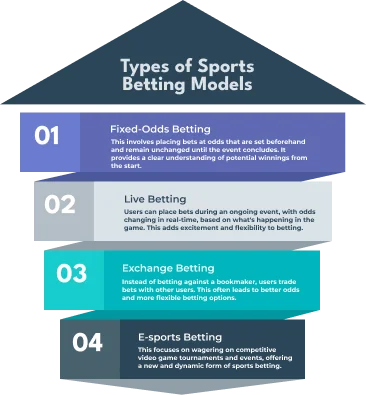Table of Content
- Expertise Expertise
- Services
- Blockchain
- Solutions
Exchange Development
Banking & Fintech
Wallet
Trading Bots
DEFI
NFT
Game Development
- Blog
- Company
- Get in Touch
March 28, 2025
Table of Content
The sports betting industry is booming, with the global market projected to reach $94.99 billion by 2029 at a CAGR of 5.09%. This rapid expansion is fueled by increased smartphone accessibility, regulatory changes, and the growing popularity of online betting.
For entrepreneurs looking to develop a sports betting app, understanding the different betting models, compliance requirements, and technology choices is crucial.
This guide covers everything you need to know, from features and tech stack to costs and real-world insights.
Before starting development, it's essential to choose the right betting model for your app,

Fixed-Odds Betting
This involves placing bets at odds that are set beforehand and remain unchanged until the event concludes. It provides a clear understanding of potential winnings from the start.Live Betting
Users can place bets during an ongoing event, with odds changing in real-time, based on what's happening in the game. This adds excitement and flexibility to betting.Exchange Betting
Instead of betting against a bookmaker, users trade bets with other users. This often leads to better odds and more flexible betting options.E-sports Betting
This focuses on wagering on competitive video game tournaments and events, offering a new and dynamic form of sports betting.
Conduct a thorough analysis of industry trends, user preferences, and competitor strategies to identify market gaps and opportunities. Segment your target audience by demographics and betting behaviors to tailor your sports betting app’s features effectively. Make sure to study regional legal frameworks to ensure compliance during later stages.
For Example, In the U.S., operators need state-specific gaming licenses, whereas the UK requires approval from the UK Gambling Commission.
Secure a gambling license from relevant authorities to operate legally in your target regions. This step ensures compliance with local regulations and builds user trust by demonstrating legitimacy.
Note: Licensing requirements vary by jurisdiction, so consult legal experts early.
Create intuitive wireframes and prototypes prioritizing easy navigation and engagement for sports enthusiasts. Collaborate with designers to ensure a sleek, uncluttered interface aligned with branding and user expectations. Test designs iteratively to refine usability and visual appeal.
Build the sports betting app’s front-end using frameworks like Flutter or React Native for cross-platform responsiveness. Develop a scalable back-end with Node.js or Python, leveraging cloud services like AWS for peak performance. Divide tasks into modules for parallel development and efficient progress tracking.
Incorporate APIs for real-time sports data and secure payment gateways like Stripe or PayPal. Ensure seamless integration with betting providers and geolocation services for regional compliance. Prioritize API reliability to avoid downtime during live events.
Implement robust encryption and multi-factor authentication to protect user data. Conduct regular security audits and adhere to regulations like GDPR or AML policies. Include responsible gambling features such as deposit limits and self-exclusion tools.
Perform unit testing for individual modules and integration testing for end-to-end functionality. Simulate high-traffic scenarios to ensure stability during major events. Gather user feedback via beta testing to address usability issues before launch.
Optimize app store listings with SEO-friendly keywords, engaging visuals, and clear descriptions. Execute targeted digital marketing campaigns through social media influencers to drive downloads. Monitor post-launch performance metrics like crash rates and user retention.
Leverage promotions and affiliate partnerships to sustain user growth. Roll out updates with new features based on user feedback and maintain 24/7 customer support and regular security patches to ensure long-term success.
When creating a sports betting app, incorporating the right features is crucial for user engagement and operational efficiency.
Here are some key features categorized into user-centric, admin-centric, and advanced features,

User Registration And Profile Management
This feature allows users to easily sign up sports betting app and manage their profiles, including payment preferences and betting history. It also provides a personalized experience by allowing users to customize their profiles.Betting Markets And Odds
Offers a wide range of betting options, including live events and multiple sports categories, with dynamic odds that update in real-time. This feature ensures users have access to diverse betting opportunities.
Secure Payment Gateway
Integrates multiple payment options like credit cards, e-wallets, and cryptocurrencies, ensuring quick and secure transactions. This feature is crucial for user trust and convenience.
Live Match Streaming And Updates
Provides real-time match streaming or score updates, keeping users engaged while placing bets. Push notifications alert users to key events like goals or match outcomes.
Bet Slip Management
Allows users to easily add, remove, or modify bets, displaying potential payouts and tracking bet history for transparency. This feature simplifies the betting process.
AI-Powered Betting Suggestions
Offers personalized bet recommendations based on user behavior and AI analysis of sports data. This enhances user engagement by providing predictive insights.
Social Betting and Community Features
Enables users to share bets, discuss strategies, and participate in group bets. And leaderboards and challenges boost user engagement and community interaction.
User Management
Helps admins manage user accounts, monitor registrations, track user activity, and ensure a secure environment. This feature simplifies user account oversight.
Reward & Payment Management
Streamlines prize distribution and payment processes, allowing admins to review payouts and track financial transactions accurately. This ensures smooth operation and user satisfaction.
Game Management
Allows admins to control the gaming arena by adding, modifying, or removing games, setting schedules, and managing odds. This feature empowers admins to create an engaging experience.
Bookmaker Management
Enables admins to efficiently handle bookmakers and odds, customizing settings and ensuring consistent updates. This maintains a competitive edge and provides users with diverse betting options.
Marketing Tools
Helps admins run promotions, track performance metrics, and attract new users effectively. This feature simplifies marketing efforts and enhances user engagement.
AR/VR Integration
Offers immersive experiences with augmented reality (AR) for live stats and virtual reality (VR) for a simulated sportsbook environment. This feature enhances user engagement and provides a unique experience.
Cryptocurrency Integration
Allows betting with cryptocurrencies, offering faster transactions and anonymity. Wallet integration manages digital assets directly within the sports betting app.
Blockchain Integration
Enhances security and transparency by using blockchain technology for transactions. This builds trust among users and ensures secure betting.
Real-Time Chat Support
Provides AI-powered chatbots for instant user support, enhancing the overall user experience and resolving queries efficiently.
Gamification And Social Betting Communities
Incorporates achievements, leaderboards, and group betting features to make betting more interactive and rewarding. This fosters a sense of community among users.
Here's a list of the tech stack required for sports betting app development, categorized by programming languages, databases, third-party APIs, and real-time analytics.
Used to build both the frontend and backend of a sports betting app, ensuring smooth user interaction and reliable server-side operations.
JavaScript frameworks (like React) create responsive interfaces, while Kotlin/Swift power high-performance mobile apps.
Backend languages like Node.js, Python, or Ruby handle real-time data, user requests, and heavy traffic loads efficiently.
Databases store and manage all critical app data, including user profiles, betting history, and transaction records.
Relational databases like PostgreSQL/MySQL ensure data accuracy and consistency, while NoSQL databases like MongoDB offer flexibility for unstructured or rapidly changing data.
Choosing the right database setup ensures secure and fast data retrieval in a mobile sports betting app.
Third-party APIs provide essential external data and services to enhance the sports betting app’s functionality.
Sports data APIs (e.g., Betfair, OddsAPI, SportRadar) deliver live odds, scores, and stats, while payment gateways (Stripe, PayPal) ensure secure and seamless financial transactions.
These integrations are vital for real-time betting and user convenience in any sports betting app.
Real-time analytics tools track user activity, app performance, and live data flow, ensuring a responsive and optimized experience.
Platforms like Firebase and Datadog offer insights into user behavior, while Apache Kafka handles live odds updates and bet processing.
This ensures a mobile sports betting app can deliver fast, accurate, and engaging experiences.

The complexity of features, such as live betting, real-time analytics, and AI-driven insights, significantly impacts development costs.
Advanced features require more resources and expertise, thus increasing the overall cost. However, simple apps with basic features are less expensive to develop.
Developing for multiple platforms (iOS, Android, web) increases costs due to the need for platform-specific development or cross-platform frameworks.
Native apps for a single platform can be more expensive but offer better performance. Cross-platform development is cost-effective but may compromise on a native-like experience.
A well-designed UI/UX enhances user engagement but also increases development costs. Custom designs with interactive elements and animations are more expensive than basic minimalist designs.
Remember, a good UI/UX is crucial for retaining users and improving app ratings.
The size and expertise of the development team directly influence costs. Larger teams with specialized skills in areas like AI or blockchain are more expensive.
Hiring local developers can be costly compared to outsourcing to regions with lower labor costs.
Integrating third-party APIs for sports data, payment processing, and other services adds to the cost. The complexity and number of integrations can vary widely, affecting overall expenses.
Ensuring compliance with gambling regulations and implementing robust security measures like encryption and KYC processes increases costs.
These measures are crucial for legal operation and user trust. Regular security audits and updates are necessary to maintain compliance.
Licensing fees for proprietary technology or data feeds can vary significantly. These fees are necessary for accessing real-time sports data or using specific betting platforms.
The cost depends on the type and quality of data or technology licensed.
Marketing expenses, including advertising and promotional offers, are essential for attracting users but add to the overall cost.
Effective marketing strategies can drive user engagement and retention. Budgeting for ongoing marketing efforts is crucial for long-term success.
For example, FanDuel and DraftKings reportedly invested millions into compliance and marketing to dominate the U.S. market.

Complying with legal requirements across different jurisdictions is complex and costly. Obtaining the necessary licenses is essential but can be a lengthy and expensive process. Legal compliance ensures your sports betting app operates legally and builds user trust.
Protecting user data from cyber threats is crucial due to the sensitive nature of financial transactions and personal information. Ensuring compliance with data privacy laws like GDPR and CCPA is necessary to avoid legal repercussions. Implementing robust encryption and secure authentication protocols is essential during online sports betting app development.
Handling high traffic during major events without downtime or latency is a significant technical challenge. Implementing scalable cloud infrastructure and load balancing helps manage peak loads effectively. Regular performance testing ensures the sports betting app can handle sudden spikes in usage.
Integrating reliable real-time sports data feeds can be technically challenging and expensive. Ensuring secure and diverse payment options while managing high-risk transactions is also complex. Robust APIs and secure payment gateways are crucial for seamless integrations.
Creating an intuitive and engaging user interface enhances user retention and satisfaction. Incorporating features like AI-driven insights and social interactions keeps users engaged. Personalized experiences based on user behavior improve overall app engagement.
Implementing robust fraud detection systems prevents identity theft and financial fraud. Advanced algorithms and machine learning models help identify suspicious betting patterns. Regular security audits ensure the system remains effective against evolving threats.
Standing out in a crowded market requires innovative features and targeted marketing strategies. Effective user acquisition and retention strategies are crucial for long-term success. Continuous market analysis helps in adapting to changing user preferences.
Regularly updating the app ensures compliance with evolving regulations and user expectations. Providing responsive customer support addresses user queries and issues promptly. Continuous monitoring and maintenance are necessary to maintain app stability and user trust.

Sports betting apps earn a commission from each bet placed, known as the vig or juice. This commission is typically a percentage of the total wager amount or winnings. It is a primary and scalable source of revenue for betting platforms.
In-app purchases allow users to buy additional features or premium content, such as enhanced odds or exclusive betting tips. These purchases provide an extra revenue stream beyond traditional betting commissions.
Advertising revenue comes from displaying targeted ads within the app, often from sports-related brands or other betting services. These ads can be highly effective due to the app's targeted audience. Revenue is typically generated on a cost-per-click (CPC) or cost-per-thousand impressions (CPM) basis.
Subscription-based models offer users premium features like advanced analytics, ad-free experiences, or exclusive content for a recurring fee. This model provides predictable revenue streams and encourages user retention. Subscriptions can be customized to different tiers of service.
Affiliate partnerships involve collaborating with other betting platforms to earn commissions from referrals. Users are directed to partner sites through affiliate links, and the app earns a commission for each new user acquired.
Some sports betting apps charge a nominal participation fee for users engaging in betting activities. This fee can be a flat rate or a percentage of the bet amount. It ensures that all users contribute to the app's revenue, even if they don't place large bets.

DraftKings is a leading sports betting app in the U.S., known for its wide selection of betting markets and user-friendly interface. It offers a variety of promotions and contests, making it popular among users. DraftKings is particularly famous for its daily fantasy sports offerings, which have expanded into traditional sports betting.
FanDuel is another prominent sports betting app in the U.S., offering a great user experience and a focus on same-game parlays and player props. It provides competitive odds and frequent promotions, making it a favorite among bettors. FanDuel's app is highly rated for its ease of use and comprehensive betting options.
Bet365 is a globally recognized sports betting app, offering live streaming and a modern design. It provides a wide range of betting markets and competitive odds, making it popular worldwide. Bet365's app is praised for its reliability and user-friendly interface, allowing users to place bets and watch live events seamlessly.
Betfair is known for its exchange betting model, where users can trade bets with each other rather than against a bookmaker. This unique approach often provides better odds and more flexible betting options. Betfair's app is highly regarded for its innovative features and extensive market coverage.
PaddyPower is a well-established sports betting app in Europe, famous for its humorous marketing and competitive odds. It offers a wide range of betting markets and innovative promotions, making it a favorite among users. PaddyPower's app is praised for its user-friendly interface and strong customer support.
Developing a successful sports betting app requires careful consideration of various factors, from legal compliance and user experience to scalability and security.
By understanding these elements, entrepreneurs can create sports betting apps that not only meet regulatory standards but also provide engaging experiences for users. However, navigating these complexities can be challenging without the right guidance.
Fourchain, a leading sports betting app development company is here to help! Our team offers comprehensive expertise in sports betting app development, from selecting the right tech stack to ensuring seamless integrations with third-party APIs.
We prioritize robust security measures and compliance with gambling regulations, ensuring your sports betting app is both secure and legally sound.
By partnering with Fourchain, you can leverage our expertise to create a sports betting app that stands out in the market, offers a superior user experience, and drives business success.
Let us help you turn your vision into a reality!


Connect With Us Now
Drop us a line through the form below and we'll get back to you as soon as possible